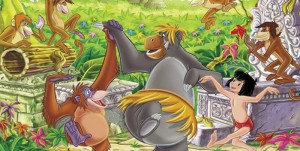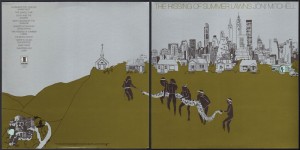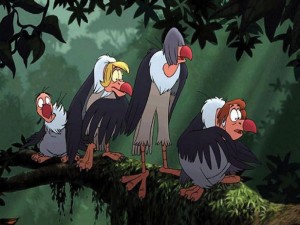Jungle Beats

By Nancy Buchan
To my amazement and delight I find myself living right next to a real jungle. Not in the dense thick of it, but it is nearby and there’s plenty of proof that the animals and insects and birds and plants share its edges with us town dwellers. There’s always a symphony of noises coming out of this primal area – sometimes I don’t even get out of my hammock to see what kind of critters are having issues in my yard, or what type snake just slithered into the bushes. Like most of us, before I moved here my jungle knowledge was derived from books, paintings, photos, cartoons and songs….
In the book category, I’ve always enjoyed adventure books that take place in distant locales, and as a kid I read and loved Rudyard Kipling’s collection of stories called The Jungle Book. Kipling was English, but he and his family had spent time in India and he wrote these fables while living in Vermont. Fables are all about moral lessons, and these were about a young Indian boy, Mowgli, who was raised in the jungle by animals, and about him learning self-reliance and other lessons from them. This is a work that raised timeless questions about the relationship between man and the animal world, about nature and society and about innocence and corruption. These were not exactly happy little tales, but they illustrated the reality of living where everything is part of the natural order of things – whether you are the predator or the preyed upon.
Then there are the paintings of French artist Henri Rousseau. He was a post Impressionist painter in what art snobs call the Naïve or Primitive school. He was ridiculed during his lifetime since he had never learned anatomy or perspective or realistic scale, but he influenced all kinds of folks, from Picasso to the American poet Sylvia Plath to the guys that did the animated film Madagascar. He never made any money from his art, worked most of his life as a tax collector, and ended up playing the violin on the street for tips. A lot of his paintings had tigers or lions or other animals in them, his most famous one being the Sleeping Gypsy – where he depicted a lion hovering over a robed person lying on the desert sand. But his jungle paintings really hooked me on him – combat between a tiger and a water buffalo, or serpents coming out of the trees to enfold a naked woman. He never left France or saw a real jungle, so he got his inspiration from book illustrations and taxidermists and hanging out in botanical gardens. He captured (at least to me) the dark mystery of such places – animal eyes peering out of the foliage right at me and the beautiful but scary vulnerability of us humans.
Before you could look up anything and everything on the internet, there was National Geographic magazine, whose fine photographers traveled to exotic sites and went to great lengths to capture images of places and creatures most of us will never see in our regular old lives. These guys visited and got to understand places the rest of us only dreamed about, and brought us photographic proof of the elusive and rare critters to be found in jungle habitats. I remember eagerly waiting for the postman to deliver this monthly glimpse into other realities. The world is smaller now, and anyone who has the dough can go on a safari, but the pictures from that magazine fed our imaginations and educated us to our relevance in the big scheme of Mother Nature.
There are a bunch of songs that refer to the jungle, but most modern songs are using the jungle as a metaphor of life in the unforgiving urban jungles many of us live in. Guns N’ Roses great rock song, ‘Welcome to the Jungle’, is about the dark side of cities and our alienation from others and our appetites for the destructive stuff. As is Bob Marley’s song ‘Concrete Jungle’. The Steve Miller Band’s song ‘Jungle Love’ is all about jealousy and love and sex and papayas and wetness and that “Jungle love it’s drivin’ me mad – it’s making me crazy.” ‘Run Through the Jungle’ was written by John Fogerty, lead singer, guitarist and songwriter from Creedence Clearwater Revival band. It’s his passionate criticism of the gun-happy, uncontrolled proliferation of weapons in America. It’s been used in several movies and tv shows (Forrest Gump, the Big Lebowski, Entourage) and had background jungle sound effects created by the bass player and by recording the piano and guitar backwards. Check out a bit of the lyrics – “Thought I heard a rumblin’ callin’ to my name. Two hundred million guns are loaded – Satan cries ‘take aim!’ Better run through the jungle….” Quite a few songs with jungle references are out there – like Jethro Tull’s heavily symbolic ‘Bungle in the Jungle’, which makes analogies between the human condition and the animal kingdom and it’s intermingling of good and evil.

Joni Mitchell, who has always written deep and intelligent lyrics, put out an album in the mid-seventies that was a huge departure from her typical folk/pop tunes and explored the nuances of jazz music. On the album (Hissing of Summer Lawns) was a moody, tense and dark song called ‘The Jungle Line’. She used Jungle Beats the Royal Drummers of Borundi tribal pounding and chanting in the background, and even referenced the painter Rousseau in the opening lines. It was partially about the trade-offs women make for power and freedom, and was unsettling in its mixture of elusive concepts and urban lyrics. A masterpiece of lyrical symbolism and musical mood.
But perhaps the coolest of all artistic depictions of the jungle has got to be Walt Disney’s last project, the 1967 animated film The Jungle Book. Not to be confused with the lame George of the Jungle cartoons where a parody of Tarzan keeps crashing into trees, but a lighter and happier and music filled film that combined sophisticated jazz with skillful animated art and the lessons of Kipling. New Orleans wacky and beloved Louie Prima was the voice of the king of the monkeys, and Disney even used Prima’s bands audition tape as a blueprint for the monkeys dancing and physical actions. The son of Italian immigrants, Louie Prima was a larger than life kind of guy whose musical career spanned several decades, and whose legacy continues today with a daughter who leads a band out of New Orleans. He was a Dixieland and swing player, influenced by Louis Armstrong and other black jazz guys, and a gambler and womanizer who loved expensive clothes. He was famous (long before Van Halen’s version) for the song ‘Just a Gigalo’, ‘Please No Squeeza Da Banana’ and ‘I’ll Be Glad When You Dead, You Rascal You’. There were some great songs that came out of this film – ‘The Bear Necessities’ and ‘I Wanna Be Like You’ being my favorites.

In the original Kipling book the vultures are grim and evil characters who feast on the dead, and the first set of Disney’s writers followed that sinister mood. Disney fired them, and lightened things up by having the vultures bear a physical and vocal resemblance to the Beatles, complete with mop-top haircuts. They were supposed to actually sing ‘That’s What Friends Are For’ in the film, but scheduling problems and some kind of attitude from John Lennon de-railed those plans and English musician Chad Stewart (from Chad and Jeremy fame) sang the song instead. The film is great and fun and musically still pretty darn hip – check it out if you somehow missed it!
Also check out a BUNCH OF DAMN MONKEYS! Aka Ben Jammin’ and the Howlers, this band is comprised of Ben Orton on flaming guitar, vocals and songwriting, Arturo Alcocer on bass and vocals, Tim Rath, a multi-talented simian on drums, bass, guitar and vocals, and myself on 5 string electric violin. We play most every Friday night at Roca Verde, a beautiful, spacious and excellent restaurant just south of Dominical, and look for us around the area. Thanks for supporting live monkeys and live music!
“He who made kittens put snakes in the grass. I’m a tiger when I want love but I’m a snake if we disagree.” Ian Anderson of Jethro Tull – from the song ‘Bungle in the Jungle’.
“A monkey, after getting drunk on brandy, would never touch it again, and thus is much wiser than most men.” Charles Darwin
“Just cause you got the monkey off your back doesn’t mean the circus has left town.” George Carlin
